 Petzlover
Petzlover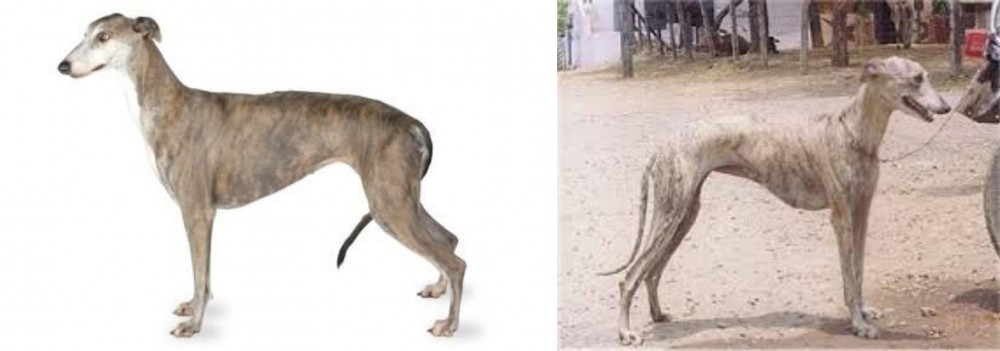 Greyhound is originated from United Kingdom but Rampur Greyhound is originated from India. Both Greyhound and Rampur Greyhound are having almost same height. Greyhound may weigh 10 kg / 23 pounds more than Rampur Greyhound. Both Greyhound and Rampur Greyhound has same life span. Greyhound may have more litter size than Rampur Greyhound. Both Greyhound and Rampur Greyhound requires Low Maintenance.
Greyhound is originated from United Kingdom but Rampur Greyhound is originated from India. Both Greyhound and Rampur Greyhound are having almost same height. Greyhound may weigh 10 kg / 23 pounds more than Rampur Greyhound. Both Greyhound and Rampur Greyhound has same life span. Greyhound may have more litter size than Rampur Greyhound. Both Greyhound and Rampur Greyhound requires Low Maintenance.
 The Greyhound belongs to a group of dogs known as sighthounds. This is an ancient sighthound breed dating back a few thousands years.
The Greyhound belongs to a group of dogs known as sighthounds. This is an ancient sighthound breed dating back a few thousands years.
The dog has been bred for racing but today is also a popular pet. They’ve also been used for hunting too because of their keen eyesight and sense of smell.
In the United States there are Greyhounds registered with the American Kennel Club as well as those registered with the National Greyhound Association.
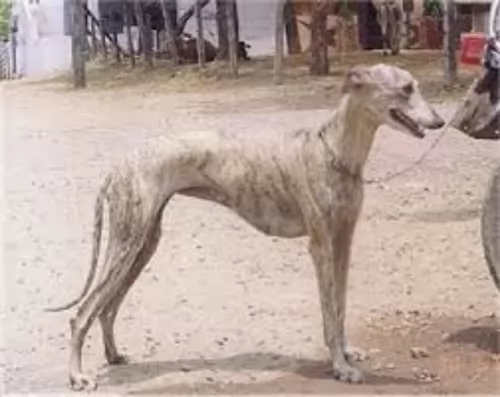 Known also as the North-Indian Greyhound or the Rampur Hound, the Rampur Greyhound is native to the Rampur area of Northern India.
Known also as the North-Indian Greyhound or the Rampur Hound, the Rampur Greyhound is native to the Rampur area of Northern India.
This dog is a member of the sighthound family, and in the past has been sought after for its efforts in controlling jackals.
The dog is also able to cover large distances at high speed. Some commemorative postage stamps were issued in 2005 as acknowledgement of this attractive dog breed.
 The Greyhound is a tall, muscled, long-legged, slender dog with a flexible spine, a deep chest and exceptional eye sight.
The Greyhound is a tall, muscled, long-legged, slender dog with a flexible spine, a deep chest and exceptional eye sight.
The Males are usually about 71 to 76 cm in height with the females being slightly smaller. The dogs weigh in the region of 27 to 40 kg. The coat of the dog is short and smooth and is found in an assortment of colors, from fawn to white, tan, black and brindle.As far as grooming goes, he is looked upon as a low maintenance breed.
He has a long narrow muzzle, semi-erect/semi-floppy short ears and a long slender tail.
Sometimes referred to as being hypoallergenic, you need to allow your Greyhound indoors as the dog doesn't have an undercoat. He is therefore more susceptible to extreme temperatures. The face is long, narrow and pointed, the ears short and half-erect-half-floppy with a long, thin, whip-like tail.
Intelligent and gentle, the Greyhound is described by those who have owned them as wonderful pet. They are somewhat aloof around strangers but love their own human family. This is a non-aggressive, gentle, docile, calm dog. They are loving and get on well with their entire family, whether human beings or pets.
They’re sensitive dogs who appreciate quiet, calm environments. They may be quiet, but they are still social, loving the company of their family. They’re not great barkers and because they are non-aggressive, they don’t make wonderful guard dogs.
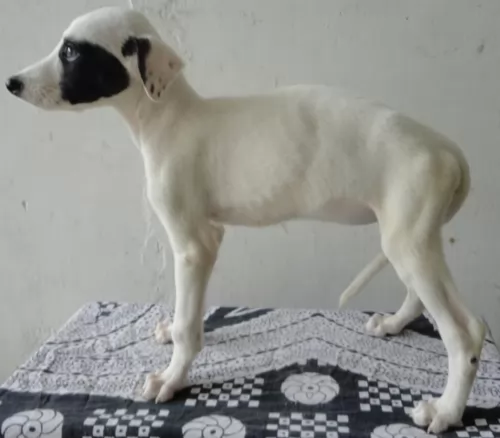 In height, the Rampur Greyhound stands at between 55 and 75 cm and they weigh in the region of 27 to 30kg.
In height, the Rampur Greyhound stands at between 55 and 75 cm and they weigh in the region of 27 to 30kg.
They are much the same as other greyhounds, but they’re somewhat wider and just a little bit more muscular. The head too, is broader than the slimmer head of the English Greyhound. Of course these dogs are known for the slim, pointed nose, the high-set ears which are sometimes half-floppy, half-erect. The eyes are large and the tail is long and slim.
The coat is short and smooth and is in colors such as gray, fawn, some white, some black with white and some brindle.
Your Rampur Greyhound is social around his human family, lapping up all their attention. He is the kind of dog that can be seen sprinting at high speed over the fields, but he is also not averse to lying peacefully with you on the sofa.
He is far better suited to a home with large gardens or on a farm as opposed to being confined to a small property in the city.
He can be gentle but when required, he becomes an excellent watchdog. He will need training and socialization as he can be rambunctious indoors, knocking things over. Training makes him obedient and restrained They get on well with children and other pets in the home.
 The Greyhound, forgetting about the racing part, makes a superb pet too. He won't do well in a household where there are screaming, noisy children and adults as he wants a quiet home to live in.
The Greyhound, forgetting about the racing part, makes a superb pet too. He won't do well in a household where there are screaming, noisy children and adults as he wants a quiet home to live in.
He can get on well with kind, gentle, respectful children as well as with pets in the home. Just like any dog, he will also need training and socialization as this can build up his confidence and then he knows how to please his owners and what they expect.
The Greyhound will require a gentle, fair, kind owner who understands his need for peace and quiet, and then he becomes a most wonderful devoted, loyal and loving pet.
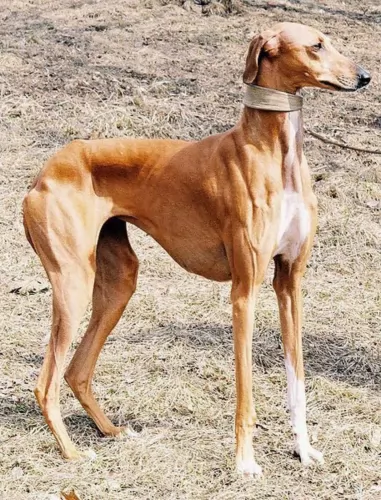 Everyone loves the Rampur Greyhound, and why not? He is fantastic with children because of his gentle, loving nature. He is a playful dog too and will require a daily dose of exercise.
Everyone loves the Rampur Greyhound, and why not? He is fantastic with children because of his gentle, loving nature. He is a playful dog too and will require a daily dose of exercise.
They aren’t noisy dogs, being naturally timid, but he still loves to get out and about with his daily walk to see and experience new sights and smells.
When you bring a Rampur Greyhound into your home, you’re bringing in a whole lot of wonderful companionship, love and loyalty from this remarkable canine.
 Greyhounds are a wonderfully healthy dog breed and with good care can reach 14 years of age. They aren't prone to many genetic illnesses and unlike so many other dog breeds, this is one dog that doesn't battle with hip dysplasia – in fact it is almost unknown among this tall, slim dog breed.
Greyhounds are a wonderfully healthy dog breed and with good care can reach 14 years of age. They aren't prone to many genetic illnesses and unlike so many other dog breeds, this is one dog that doesn't battle with hip dysplasia – in fact it is almost unknown among this tall, slim dog breed.
The Greyhound does however, have a deep chest and this is what makes him vulnerable to bloat or gastric torsion. You have to take action quickly if you detect bloat – the stomach swells up – as this is a life-threatening condition that can occur quickly when air is trapped in the stomach. The stomach can become twisted.
Make sure your Greyhound doesn't gobble his food too quickly and preferably give him smaller meals as opposed to one or two large bowls of food.
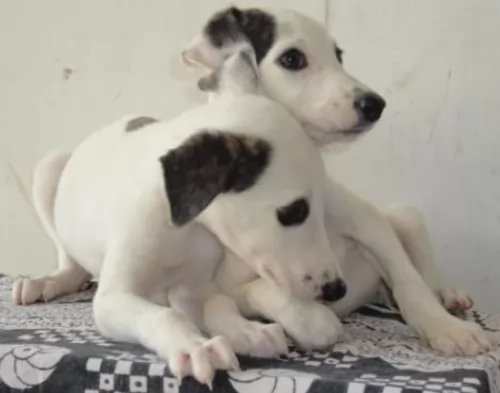 Rampur Hounds are generally a healthy dog breed, and their health is enhanced when you take good care of them and provide them with lots of love, good food and exercise.
Rampur Hounds are generally a healthy dog breed, and their health is enhanced when you take good care of them and provide them with lots of love, good food and exercise.
Still, every dog can fall prey to any one of the many dog illnesses there are such as cancer, bloat, diabetes, ear infections, epilepsy, obesity, eye problems and others.
This can be deadly for your dog. Gas collects in the stomach and the stomach can twist. You’ll notice your dog has a hard, swollen stomach and he is lethargic, but restless. Getting him to the vet as quickly as possible should be a top priority.
Your pet can develop all kinds of skin problems where he bites and scratches, causing bacteria. It can be terribly painful for your pet, and even ticks and fleas on the skin can cause cause a lot of irritation for your pet.
Some people add in omega 3 oils to their pet’s diet to help with dry skin. Don’t let your pet suffer with skin allergies and other problems that are itchy and painful. Get him to the vet so you can get to the root of what is causing him so much frustration with his skin.
 Your Greyhound’s breeder will be the best guide for the type of- and the amount of dog food your hound will need. Of course, a growing puppy has different nutritional needs from a mature or senior Greyhound.
Your Greyhound’s breeder will be the best guide for the type of- and the amount of dog food your hound will need. Of course, a growing puppy has different nutritional needs from a mature or senior Greyhound.
Growing puppies and young dogs use a lot of energy so they will require a diet rich in protein. According to Greyhound experts, an adult Greyhound dog will need an average daily caloric intake of 1740 calories.
Older dogs and those that have been spayed or neutered will need less. Apart from the very best quality kibble, your Greyhound will most certainly require raw meat from time to time. You can also give him some cooked chicken, vegetables and brown rice. He should have access to a constant supply of fresh, cool water.
The Greyhound's coat is smooth and short and he sheds very little so he will only need a gentle brush-down once or twice a week.
Having a relaxed lifestyle is what your Greyhound will love. He is a dog that needs to spend time indoors. When outdoors, whether you live in the city or the country, he will need daily walks and a run in the park regularly.
Just because he is a sprinter, it isn't wise to take him with you with cycling or jogging as he is geared for a short burst of speed as opposed to a long run.
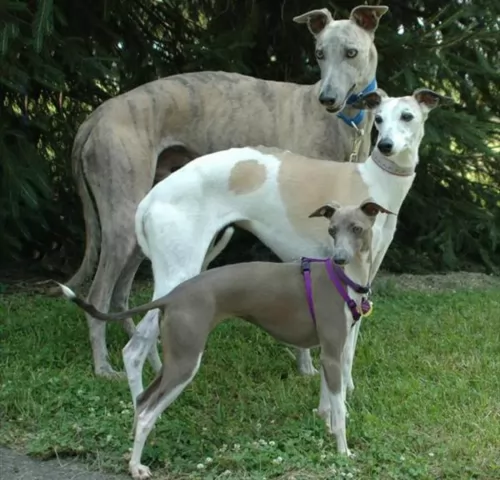 Active and playful, your Rampur Hound will need a lot of space to let off steam and run. He will look forward to his walks every day with you. Maybe you’ll need a tennis racquet to hit the ball far enough for him to sprint after.
Active and playful, your Rampur Hound will need a lot of space to let off steam and run. He will look forward to his walks every day with you. Maybe you’ll need a tennis racquet to hit the ball far enough for him to sprint after.
These dogs, with their short coats, are considered to be low maintenance, even though they do shed.
A good brush twice a week will do them good and they just love being massaged. It’s your time to run your hands over the slim, muscled body to make sure there are no unusual lumps on him.
Follow a regular grooming regime when you brush him. Check inside his ears, have a look at his eyes to make sure they’re still bright. Check inside his mouth for bad teeth which could be causing him terrible pain and make sure to trim his nails.
To be healthy and content, every dog needs good food.For convenience it can be great to feed your Greyhound one of the high quality commercially manufactured dog foods. To vary the food occasionally, add in some delicious home-made food too.
Once or twice a week you can simply add some home-made food to the dry kibble. Boiled chicken, brown rice or pasta and spinach, sweet potatoes and carrots are a healthy choice for your pet. Nothing complicated.
If you cook it in bulk, you can chop it all up and feed smaller portions to your pet. Some raw meat added in from time to time will also keep him healthy.
A simple meal like this will please your dog no end. No exotic spices and strange, weird kinds of food which could upset his stomach – just plain and simple the way dogs love it.
Ensure there is always a bowl of fresh, cool water within his reach.